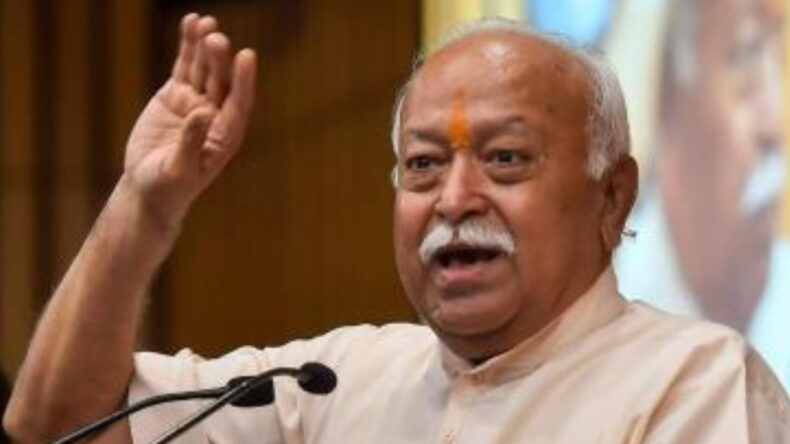Source:NDTV
RSS Chief Mohan Bhagwat Advocates for Reservations and Envisions Unified India.
Speaking at an event in Nagpur, Rashtriya Swayamsevak Sangh (RSS) chief Mohan Bhagwat emphasized the importance of reservations in addressing societal discrimination and called for their continuation as long as inequality persists. Bhagwat’s remarks came in the wake of renewed agitation within the Maratha community for quota allocation.
Highlighting the enduring vision of ‘Akhand Bharat‘ or an undivided India, Bhagwat expressed confidence that this concept will materialize within the lifetime of today’s youth. He attributed this optimism to a growing realization among those who opted for separation from India in 1947, who now perceive their decision as a regrettable misstep.
Bhagwat delved into the deep-seated issue of discrimination within society, emphasizing the need for special measures to rectify centuries of inequity. He underscored that reservations are not solely aimed at ensuring financial or political equality, but are fundamentally about bestowing respect upon marginalized communities. Bhagwat urged those who have not directly faced discrimination to bear with temporary inconveniences, emphasizing the collective responsibility of society to right historical wrongs.
Responding to queries about the RSS’s flag-hoisting practices, Bhagwat clarified that the organization consistently observes the tradition of hoisting the national flag on both August 15 and January 26 at its campuses in Mahal and Reshimbagh in Nagpur. He urged against questioning the RSS’s commitment to this practice.
Addressing concerns about the timeline for ‘Akhand Bharat,’ Bhagwat acknowledged the uncertainty but encouraged persistent efforts. He emphasized that becoming a united India hinges not on redrawing borders, but on embracing the innate essence of the nation.
Bhagwat’s address resonated with themes of historical redress, social inclusivity, and national unity. His impassioned plea for the continuation of reservations until inequality is eradicated underscored the RSS’s steadfast commitment to rectifying centuries of social inequity. Furthermore, his vision of ‘Akhand Bharat’ illuminated a path towards reconciliation and reintegration among communities that had once been divided. Bhagwat’s narratives of flag hoisting and the perceptions of those who chose separation from India in 1947 painted a vivid picture of an India poised to embrace a more inclusive and harmonious future, while remaining ever mindful of its intricate past.
What distinguished this from his previous statement? In September 2015, during an interview with publications associated with RSS, namely Panchjanya and Organiser, Bhagwat advocated for a reevaluation of reservation through an impartial panel of observers. He emphasized the formation of a committee comprising individuals genuinely concerned about the nation’s welfare and dedicated to social equality. This non-partisan committee, akin to autonomous commissions, would be tasked with determining which categories warrant reservation and for how long.
It would serve as the implementing authority, with political entities overseeing for integrity and honesty. Bhagwat’s stance in 2015 aligned with the RSS’s perspective over the preceding thirty years. In 1981, the RSS had adopted a resolution advocating for a non-political committee to assess the reservation policy, a position they maintained in subsequent decades. Notably, both the Jana Sangh and its successor, the BJP, consistently advocated for quotas for economically disadvantaged sections, in addition to emphasizing the necessity of ongoing caste-based reservation. The reservation for economically weaker individuals was implemented in 2019.
The event served as a platform for Bhagwat to engage with pressing issues and offer insights into the RSS’s stance on critical matters. His words carry weight, resonating with followers and sparking broader conversations about the path towards a more inclusive and unified India. As discussions continue to unfold, Bhagwat’s address stands as a catalyst for introspection and action, shaping the dialogue around inclusivity and unity in India’s societal landscape.
Conclusion:
The article reports on Rashtriya Swayamsevak Sangh (RSS) chief Mohan Bhagwat’s address at an event in Nagpur. Bhagwat emphasized the importance of continuing reservations as long as societal inequality persists. He also expressed confidence that the concept of ‘Akhand Bharat,’ or an undivided India, will become a reality within the lifetime of today’s youth. Bhagwat highlighted the enduring issue of discrimination and argued that reservations are crucial for rectifying historical inequities. He addressed allegations about the RSS’s flag-hoisting practices and affirmed the organization’s commitment to the tradition. Bhagwat’s speech resonated with themes of historical redress, inclusivity, and national unity, sparking discussions on these important issues.













